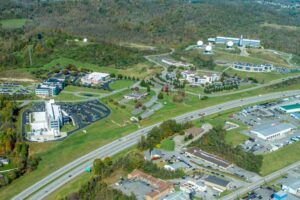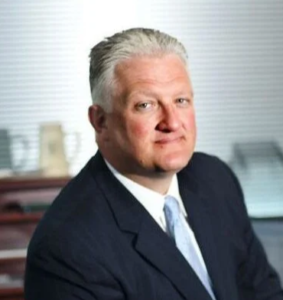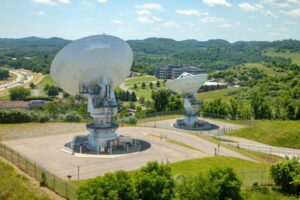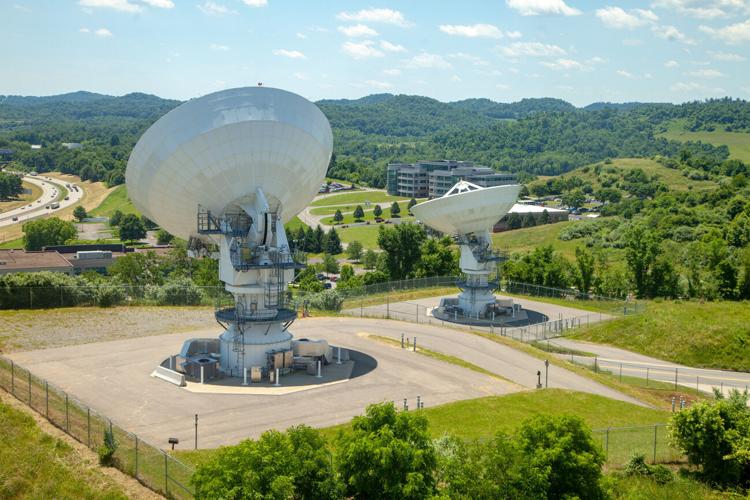by John Mark Shaver FAIRMONT NEWS EDITOR

Submitted photo
FAIRMONT, W.Va. (WV News) — NOAA recently announced that a new $100 million supercomputer soon will be installed at the organization’s center at the West Virginia High Technology Foundation’s I-79 Technology Park.
It’s a move that Foundation President and CEO Jim Estep believes will be a huge leap forward for the park.
The supercomputer, called Rhea, will support NOAA’s Environmental Security Computing Center in the park and increase the organization’s ability to forecast weather, as well as disasters like droughts, floods and wildfires, officials said.
Estep has been a large proponent of the commercial climate and weather industry for the past several years. He said bringing Rhea to Fairmont, as well as establishing the park’s supercomputing farm, will be a huge step in capitalizing on what he believes is a prime market.

“This is one of the first big things that (the park) expansion was in preparation for,” Estep said. “(Rhea) is going to help NOAA in their exploration of using artificial intelligence and machine learning to improve the weather, ocean and climate forecast and ecosystem modelling. …
“That’s a huge deal because a lot of people believe that the application of AI and ML to climate and weather modelling and prediction, especially as it relates to adapting to climate change, could be revolutionary.”
He added that this potentially game-changing technology being hosted in Fairmont means that North Central West Virginia will be leading the country in the application of AI to those climate models.
Estep said he’s long thought that West Virginia has a lot of advantages and opportunities when it comes to growing the technology and knowledge sectors. He believes that the expansion of the NOAA supercomputing farm and the installation of Rhea is a chief example of what can be achieved in The Mountain State.
“You put these building blocks in place one block at a time and you’re building the foundation for great things,” Estep said. “When something like this occurs where a major agency like NOAA says, ‘We’re taking a huge step forward in technology to address one of the most significant challenges facing mankind,’ and they look around and decide that Fairmont is that best place to be doing it, that sends the message that we’ve built something very important and valuable for our nation and the world. …

Submitted photo
“Here we are in Central Appalachia, and we could be leading the world in how to better adapt to climate change. (Hurricane Helene) is an example of why this work is so, so critical, and the fact that we’re going to be right there on the front line is exciting and shows we can do whatever it is that needs to be done in West Virginia.”
Beyond the advancements with NOAA, Estep said the Foundation and Technology Park are in a good place. He noted that his team is working on plans to fund the further expansion of Phase III of the park, which he hopes will begin in spring or summer of 2025.
Over the next couple of years, Estep wants to work on significant infrastructure development in Phase III of the park. He added that the foundation has been “aggressively” working with West Virginia University and Microsoft Corporation on an ecosystem project that aims to help establish a basis for the commercial climate and weather industry to expand and take root in West Virginia.
“If we could start attracting more of the commercial components of that sector to our community by leveraging the NOAA investments, then we could potentially see a significant portion of what’s already shaping up to be a multi-billion dollar expansion start impacting our region locally,” Estep said.
“That’s going to be amazing not only for economic diversification but to help us keep chomping away at what I consider to be our state’s biggest handicap, and that is our lack of educational attainment.”
Fairmont News Editor John Mark Shaver can be reached at 304-844-8485 or jshaver@theet.com.
Article as originally published by WVNEWS.com on October 6, 2024.


